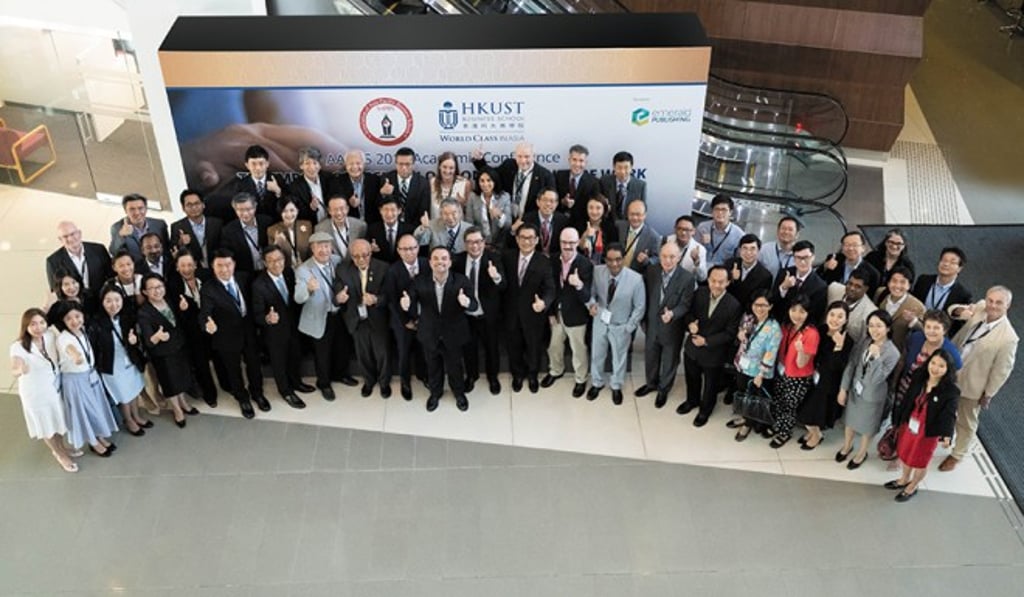Business Schools’ Conference on Digital-Age Teaching
Business schools around the world, government officials and senior executives discuss technology's future impact on teaching

[Sponsored Article]
At the end of May, the HKUST Business School welcomed fellow members of the Association of Asia-Pacific Business Schools (AAPBS) to HKUST for an illuminating academic conference on “The Impact of Technology on the Future of Work.” The forces that will shape the careers of the member schools’ students were examined during the four-day event, and ideas were put forward on the way the teaching of business programs should develop.
After greeting the participants, Professor Tam Kar Yan, Dean of HKUST Business School and the new AAPBS president, gave a brief history of the association and set out its and this conference’s goals. Formed in 2004, the AAPBS now counts more than 140 organizations among its members.
“The mission of AAPBS is to create a platform for business schools in the region to connect and collaborate,” Professor Tam explained. The key question for these schools was how to ensure their graduates had the core competencies that would enable them to cope with the challenges of the future, he added.
Hong Kong’s future as a smart city
The event's officiating speaker Ir Allen Yeung, the then Hong Kong Government’s Chief Information Officer, told his international audience about the government’s vision of the SAR as a “smart” city, with a smart workforce and a smart economy.
With powerful and robust information and communication technology infrastructure making the city a hub for the region, the government was committed to policy initiatives that would embrace technology and innovation. Starting in primary schools, science, technology, engineering and mathematics (STEM) and STEAM (also including the arts) will become central to the educational curriculum, with the acquisition of digital skills encouraged across all fields and professions.

An innovation powerhouse
The Hong Kong Science and Technology Parks Corporation (HKSTP) was established by the government to transform the city into a center for innovation and technology development. In his keynote speech, HKSTP’s CEO, Mr Albert Wong, challenged the notion that Hong Kong could build its economic future solely on its service industries.
Mr Wong pointed out that 93 per cent of Hong Kong’s GDP comes from service industries. With construction making up 5 per cent of the remainder, manufacturing accounted for less than 2 per cent. There’s nothing wrong with service industries, but the city needs diversity. It has the universities, business institutions and infrastructure, but is lacking in output in terms of creativity commercialization.
Since its founding in 2001, HKSTP has seen 542 start-ups graduate from its incubation program, with 409 still in business, and four of these having had an IPO and listing in Hong Kong. There has also been a six-fold increase in the funding raised for these incubatees, between 2016/17 and 2017/18.
With the backing of the Hong Kong and Central governments, and the advent of such huge new projects as the Lok Ma Chau Loop Innovation and Technology Park, Mr Wong hoped for a bright future for the city.
A positive tech future
Professor Eric Cornuel, Director General and CEO of the European Foundation for Management Development (EFMD), looked at the relationship between technology, business schools and society in his keynote address. Among the negative effects he saw accompanying technological progress, were burgeoning inequality, and health and privacy issues.
The risks are over-stressed societies, mass unemployment, and disenchanted and angry citizens of all generations. To help avoid this eventuality, he called on business schools to re-orientate their research work towards what he characterized as more socially responsible outputs.
The third of the conference’s keynote speakers, Mr Francis Ngai, General Manager, IBM China/Hong Kong, addressed the question of “How AI is going to Transform Business and Work.” Based on what arose from IBM’s research projects and from the insights he gleaned from the company’s partnership with client corporations, Mr Ngai said he believed the future was not an either-or situation, of man or machine. He saw human creativity only being enhanced by technology. The future of work is human intelligence augmented by artificial intelligence, he opined.
In addition to the three keynote speakers, the Conference featured a total of 16 corporate leaders, expert speakers and moderators. They shared their insights into the significant impacts of technology, discussed the skills student needed in future marketplace, and exchanged practical ideas in providing education that addresses real-world challenges in rounds of interactive discussion.
Research was also the topic of a one-and-a-half-day workshop, which was hosted jointly by the HKUST Business School and the School of Business of the Hong Kong Baptist University, and ran in addition to the presentations and panel discussions. Under the guidance of Professor Jason Davis at INSEAD, participants looked at inductive research using multiple case methods.
